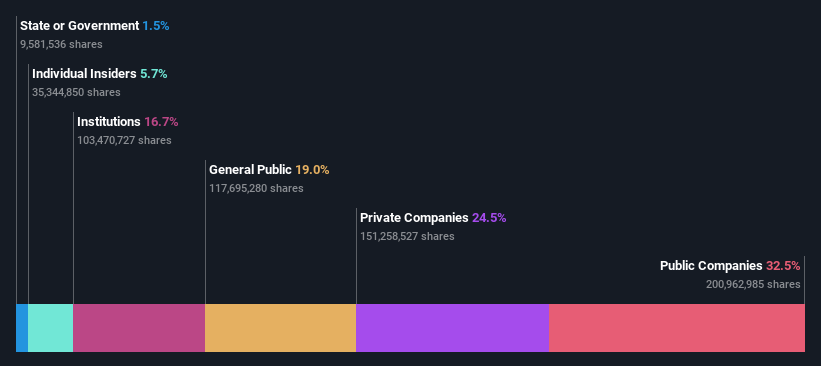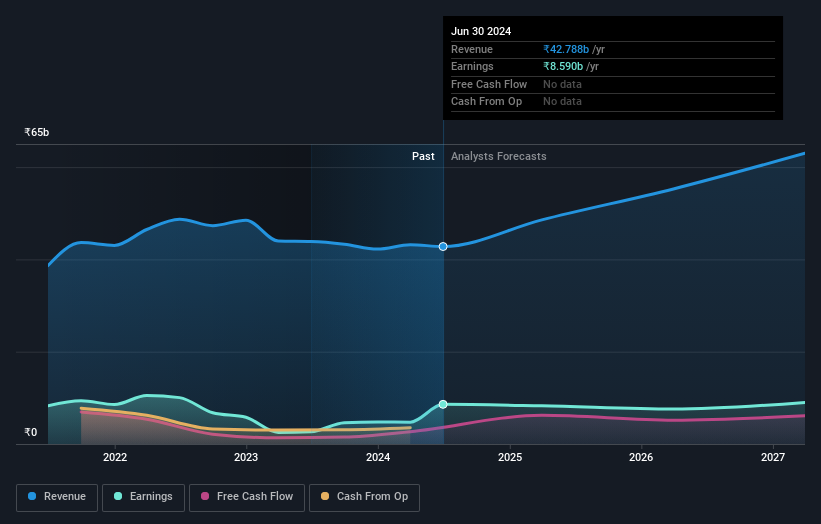Finolex Industries Limited's (NSE:FINPIPE) market cap surged ₹5.6b last week, public companies who have a lot riding on the company were rewarded

Key Insights
- Significant control over Finolex Industries by public companies implies that the general public has more power to influence management and governance-related decisions
- The top 2 shareholders own 51% of the company
- Institutions own 17% of Finolex Industries
To get a sense of who is truly in control of Finolex Industries Limited (NSE:FINPIPE), it is important to understand the ownership structure of the business. With 33% stake, public companies possess the maximum shares in the company. In other words, the group stands to gain the most (or lose the most) from their investment into the company.
As a result, public companies were the biggest beneficiaries of last week’s 3.2% gain.
Let's take a closer look to see what the different types of shareholders can tell us about Finolex Industries.
See our latest analysis for Finolex Industries

What Does The Institutional Ownership Tell Us About Finolex Industries?
Institutions typically measure themselves against a benchmark when reporting to their own investors, so they often become more enthusiastic about a stock once it's included in a major index. We would expect most companies to have some institutions on the register, especially if they are growing.
As you can see, institutional investors have a fair amount of stake in Finolex Industries. This suggests some credibility amongst professional investors. But we can't rely on that fact alone since institutions make bad investments sometimes, just like everyone does. When multiple institutions own a stock, there's always a risk that they are in a 'crowded trade'. When such a trade goes wrong, multiple parties may compete to sell stock fast. This risk is higher in a company without a history of growth. You can see Finolex Industries' historic earnings and revenue below, but keep in mind there's always more to the story.

Finolex Industries is not owned by hedge funds. Looking at our data, we can see that the largest shareholder is Finolex Cables Limited with 33% of shares outstanding. For context, the second largest shareholder holds about 19% of the shares outstanding, followed by an ownership of 6.6% by the third-largest shareholder.
A more detailed study of the shareholder registry showed us that 2 of the top shareholders have a considerable amount of ownership in the company, via their 51% stake.
Researching institutional ownership is a good way to gauge and filter a stock's expected performance. The same can be achieved by studying analyst sentiments. Quite a few analysts cover the stock, so you could look into forecast growth quite easily.
Insider Ownership Of Finolex Industries
The definition of an insider can differ slightly between different countries, but members of the board of directors always count. Management ultimately answers to the board. However, it is not uncommon for managers to be executive board members, especially if they are a founder or the CEO.
Most consider insider ownership a positive because it can indicate the board is well aligned with other shareholders. However, on some occasions too much power is concentrated within this group.
We can report that insiders do own shares in Finolex Industries Limited. It is a pretty big company, so it is generally a positive to see some potentially meaningful alignment. In this case, they own around ₹10b worth of shares (at current prices). It is good to see this level of investment by insiders. You can check here to see if those insiders have been buying recently.
General Public Ownership
With a 19% ownership, the general public, mostly comprising of individual investors, have some degree of sway over Finolex Industries. This size of ownership, while considerable, may not be enough to change company policy if the decision is not in sync with other large shareholders.
Private Company Ownership
We can see that Private Companies own 24%, of the shares on issue. It might be worth looking deeper into this. If related parties, such as insiders, have an interest in one of these private companies, that should be disclosed in the annual report. Private companies may also have a strategic interest in the company.
Public Company Ownership
We can see that public companies hold 33% of the Finolex Industries shares on issue. We can't be certain but it is quite possible this is a strategic stake. The businesses may be similar, or work together.
Next Steps:
It's always worth thinking about the different groups who own shares in a company. But to understand Finolex Industries better, we need to consider many other factors. For example, we've discovered 3 warning signs for Finolex Industries (1 is potentially serious!) that you should be aware of before investing here.
But ultimately it is the future, not the past, that will determine how well the owners of this business will do. Therefore we think it advisable to take a look at this free report showing whether analysts are predicting a brighter future.
NB: Figures in this article are calculated using data from the last twelve months, which refer to the 12-month period ending on the last date of the month the financial statement is dated. This may not be consistent with full year annual report figures.
New: AI Stock Screener & Alerts
Our new AI Stock Screener scans the market every day to uncover opportunities.
• Dividend Powerhouses (3%+ Yield)
• Undervalued Small Caps with Insider Buying
• High growth Tech and AI Companies
Or build your own from over 50 metrics.
Have feedback on this article? Concerned about the content? Get in touch with us directly. Alternatively, email editorial-team (at) simplywallst.com.
This article by Simply Wall St is general in nature. We provide commentary based on historical data and analyst forecasts only using an unbiased methodology and our articles are not intended to be financial advice. It does not constitute a recommendation to buy or sell any stock, and does not take account of your objectives, or your financial situation. We aim to bring you long-term focused analysis driven by fundamental data. Note that our analysis may not factor in the latest price-sensitive company announcements or qualitative material. Simply Wall St has no position in any stocks mentioned.
About NSEI:FINPIPE
Finolex Industries
Manufactures and sells polyvinyl chloride (PVC) pipes and fittings, and PVC resins in India.
Excellent balance sheet with proven track record and pays a dividend.


